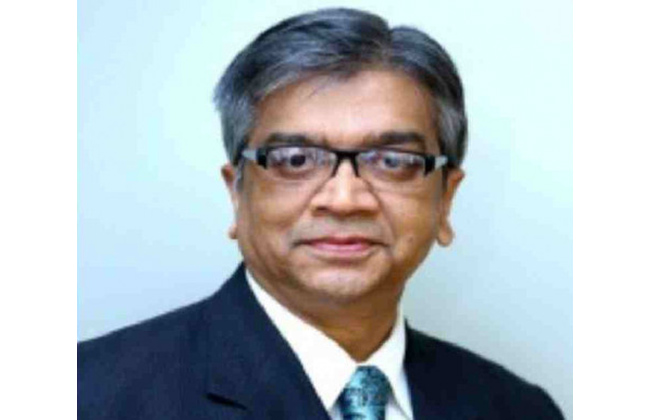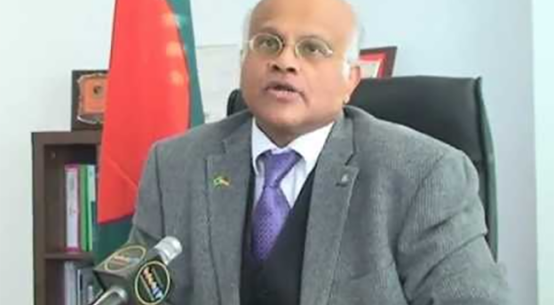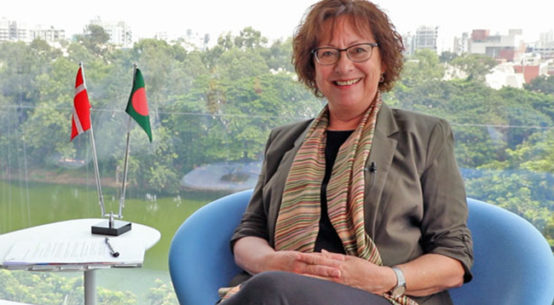
Bangladesh Ambassador to Italy Md Shameem Ahsan tells The News Times
Imtiaz Ahmed
Bangladesh Ambassador to Italy Md Shameem Ahsan in an interview with The News Times said that Italian government deeply recall the contribution of expatriate Bangladeshis to the buoyancy of the G-7 economy over the years.
“According to our information, around 150 thousand Bangladesh nationals live in Italy. The mission through Facebook, Website and other platforms of social media, successfully engaged the community and ensured the well-being of the Bangladeshi expatriates living in Italy,” said Md Shameem Ahsan, a career diplomat.
“During meetings with the officials of the Italian government, they are usually highly appreciative of our community. In fact, they acknowledge with deep appreciation that the Bangladeshis living in Italy are contributing greatly to the buoyancy of the economy of Italy”, Ahsan added.
Details of the interview as follows:
NT: The world has changed after COVID-19 has spread in over 210 countries. COVID-19 has claimed 5.00 million lives and infected several million citizens in Italy. How Bangladesh and Italy work together in post-COVID-19 situation?
MSA: The global pandemic caused by the deadly COVID-19 virus has affected the whole trajectory in terms of our thinking, lifestyle, and everything across the world. In Italy, almost 17 million people have been infected, registering nearly 170 thousand deaths. Almost every family has directly or indirectly suffered caused by the pandemic. On the other hand, owing to prompt and timely actions taken by our government, the pandemic in our country has been managed well to ensure a balance between the lives and livelihood of mass people. We have also made commendable progress regarding vaccination of our citizens.
Bangladesh and Italy enjoy excellent bilateral relations. Italy was one of the first European countries to recognize (12 February 1972) our country. We are celebrating the golden jubilee of our bilateral relations this year. Both the countries are celebrating this occasion in the respective capitals with appropriate programs. Our bilateral relations reached a new height with the official visit of the Hon’ble Prime Minister Sheikh Hasina in February 2020.
Bangladesh Embassy and the concerned Italian authorities maintained close contacts after the outbreak of the pandemic. Italy, one of the worst sufferers of the COVID-19 pandemic, imposed a temporary ban on travel from a number of countries including Bangladesh in early 2021. This affected a good number of expatriates (around 6,000) who were waiting to return to Italy. The Mission lobbied vigorously to address this issue and the initiative was successful as the ban was gradually lifted towards the end of 2021 which can be termed as an achievement of this mission considering its wide impact on remittance generation and well-being of the expatriates.
The Bangladesh embassy in Rome extended humanitarian assistance to Bangladeshi expatriates living in Italy who were severely affected by the pandemic. The mission through Facebook, Website and other platforms of social media, successfully engaged the community and ensured the well-being of the Bangladeshi expatriates living in Italy. In this regard, the Mission also remained vigilant through the Honorary Consuls of Bangladesh accredited to different regions of Italy.
At the Independence and National Day Reception of the Embassy held on 28 March, 2022, Under Secretary (Deputy Minister) at the Italian Foreign Ministry Manlio Di Stefano, joined as the Chief Guest, and announced donation of 2 million 28 thousands 07 hundreds eighty Pfizer vaccines through the Covax facility for Bangladesh to help fight the Covid-19 pandemic. This was as a friendly gesture from the Italian government on our Independence & National Day.
NT: Export basket of Bangladesh is heavily dependent on readymade garments. How can Italy help Bangladesh diversify its export basket?
MSA: We have significant trade (two-way trade volume over 2.2 billion US dollar) with Italy-the 6th largest export destination of our exports with RMG being the largest export item. Yes, we are currently working on diversification of our export basket. Italy can also help Bangladesh diversify its export baskets. They can import items like leather and leather goods, bi-cycle, ceramics, ICT, jute and jute products from Bangladesh, among others.
NT: The export of readymade garments, leather, shrimp, and software has suffered last year. Italy is a major export destination of Bangladeshi goods.
MSA: Our exports are now growing despite recent challenges posed by the pandemic. During July-March 2021-22, the export to Italy was 12 percent higher than the target and 22 percent higher than the same period of the previous Fiscal Year.
NT: How can Italy help Bangladesh in recovery of exports in the current and post-COVID situation?
MSA: Both Italy and Bangladesh can identify the comparative advantage of the exportable items and negotiate further for mutual benefit; and the relevant government and trade bodies are currently doing so. The Mission remains pro-actively engaged in this regard. MV Songa Cheetah, the first direct container ship in the Bangladesh-Italy route, has been established/operationalized between Chattogram, the port city of Bangladesh and Port of Ravenna, Italy. It departed from Chattogram on 07 February, 2022 and reached the port of Ravenna, Italy on 27 February 2022 with 952 TEUs (Twenty-Foot Equivalent Units) of exportables. This marks the opening of a new horizon for Bangladesh-Italy trade relations which will significantly boost export-import trade of RMG products not only between Bangladesh and Italy but also to whole European markets. This new arrangement is expected to reduce transportation costs by 45-50% as the shipping time will be reduced to 15 days from 45 days. The new maritime route has been established at the initiative of Italian garments importers while coordinated efforts of Italian freight forwarder company, RIF Line and its sister concern, Calipso Compania De Navigation also contributed in this regard. The Bangladesh Embassy is working closely with the relevant companies to make the arrangement more efficient, frequent, thus facilitating expansion of bilateral trade between the two countries.
NT: Bangladesh-Italy bilateral trade has crossed 200 million US dollars. What is our target to reach bilateral trade within the next five years?
MSA: Overall national target of Bangladesh for FY 2021-22 is USD 4.35 billion. For Italy, this target is USD 1.4 billion. We are very much hopeful that we can fulfill the target. In the next five years, our target might be USD 2 billion.
NT: What is the number of Bangladeshis living in Italy? How do Italian citizens and the government evaluate their contributions to the G-7 country?
MSA: According to our information, around 150 thousand Bangladesh nationals live in Italy. Many of them are engaged in different activities including in the hospitality sector, business/informal trade and other fields. The Italian government has been very warm and generous to our community who enjoy a high reputation for being extremely hard-working, peace-loving and law-abiding with the least criminal records. During meetings with the officials of the Italian government, they are usually highly appreciative of our community. In fact, they acknowledge with deep appreciation that the Bangladeshis living in Italy are contributing greatly to the buoyancy of the economy of Italy. However, there is deep concern from them regarding the issue of uninterrupted illegal migration from Bangladesh to Italy and both the countries are currently working closely to devise a legal mechanism (signing an Agreement/MoU) for migration and mobility and minimize illegal migration. Another point of disappointment on the Italian side is that many of our community members, especially female members, are not keen to learn Italian language and cultures which are important for integration. The mission takes every opportunity to sensitize our diaspora in this regard.
NT: Under the Blue Card policy, EU has agreed to recruit non-EU citizens. How are EU member countries responding to the EU Blue Card policy? Can EU member countries recruit more skilled Bangladeshi manpower, especially doctors, engineers, and nurses?
MSA: Responses to the Blue Card policy by most of the EU states are not satisfactory. Though many of the European countries are welfare states and require many skilled and semi-skilled workforces, only 37000 Blue cards have been issued by the member countries till 2019 as per statistics. https://eur-lex.europa.eu/legal-content/EN/TXT/?uri=LEGISSUM:4559508, https://ec.europa.eu/immigration/blue-card/italy_en, https://www.infomigrants.net/en/post/35134/eu-blue-card-more-flexible-rules-for-skilled-migrants-in-europe. Among them, only Germany issued 28858 cards as per above source. Italy’s position is not significant (418 cards have been issued). After Covid-19 recovery, job opportunities are going to open up in Italy and it seems that the unemployment rate is in a decreasing trend. So, I think there is still much scope for the Bangladeshi skilled workforce to come here under Blue Card policy with other non-EU citizens.
Considering the aging society of EU countries, Blue Card policy has been a well-designed way out for these countries to allow skilled and talented migrant workers to contribute to their economy. It is regarded as a key element of the New Pact on Migration and Asylum that will allow the EU countries to normalize the migration policy as well as keep their economy moving. Bangladeshi skilled human resources may be the beneficiaries of this newly adopted policy. The Mission is in close touch with the authorities in this regard.
Bangladesh is currently negotiating with the Italian government regarding signing an MoU on Migration and Mobility which will pave the way for the skilled workforce/professionals, among others, of Bangladesh. Bangladesh is one of the beneficiary countries of the Flussi Decree(Decreto Flussi) of Italy which stipulates jobs for the non-EU workers.Though not significant in numbers allocated for each country including Bangladesh, this Decree was not available for last 8 years for Bangladesh apparently due to non-return of the people who came as seasonal workers.
NT: According to newspaper reports, Italy has repatriated several thousands of unregistered citizens. How many Bangladeshis have been regularized by the Italian government?
MSA: This is a regular process to repatriate the undocumented population. Traditionally, Italian Governments as well as the society have been found extremely friendly and lenient to the undocumented foreign immigrants including our nationals. There are around 1,46,000 documented Bangladeshi nationals in Italy as per statistics of the Italian authorities. The Government of Italy declared amnesty on a number of occasions which benefitted our undocumented nationals. In early 2000, around 70000 Bangladeshis were documented under the amnesty. Recently (in 2020) 12,746 Bangladeshis applied for regularization.
NT: The Russia-Ukraine war has caused a price hike of essential goods increasing the sufferings of poor and low-ingroup consumers. How do you see the situation?
MSA: This is a crisis of people, a crisis of cost of living because it is affecting food, finance and fuel. Almost all developing countries including Bangladesh are suffering in these three dimensions. We need to be very careful and vigilant to keep the trade open so that there is no disruption of the supply chain.
NT: High inflation may slow down the growth of the Italian economy. Do you think Bangladesh’s exports, particularly readymade garments and leather to Italy will suffer?
MSA: No, it will not suffer. There is no such evidence so far in the previous months, rather our exports are growing in Italy. Our private sector leadership in RMG and Leather sectors in particular are mature enough and capable to face any crisis.


